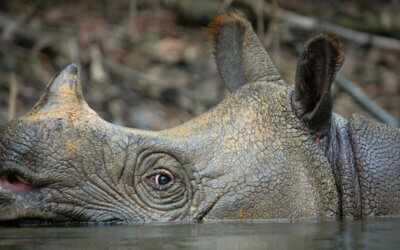Is Realism Helpful?
An Introduction to the Strategic Use of Fiction (and Realism) for Surviving and Ending Extinction
Rapidly dwindling opportunities to act in time to end the Sixth Extinction and address the climate crisis leave many of us, myself included, torn between what we think is likely about the future and what we think is possible. A global gathering for the protection of life (wild11.org), convening in India next March, promises to help bridge the gulf between realism and ambition by mobilizing leaders and communities around the world to help take the unprecedented step of protecting half of Earth’s land and seas to significantly reduce the dual threats of climate change and extinction. The best part? You’re invited.
Of the many curious and consequential artifacts collected in my workplace my favorite by far is a single-page email tucked away on a dingy shelf in the stairwell. It’s not the aesthetic of a plain white page sandwiched between two plates of cheap plastic that pleases me. No, what sends shivers of delight down my spine when I pass it in the morning on my way for a cup of coffee is the defiant spirit that placed it there. Humming with the energy of a 60s rock concert, it is a protest anthem made manifest in memo format.
When in the history of things has a lusterless styrene frame so proudly showcased the trophy of a fomenting rebellion?
It was composed nearly 10 years ago by a prominent international conservation official. He aimed to deflate the “unrealistically ambitious” intention of the WILD Foundation (the NGO for which I work) to persuade the world to protect half of Earth’s land and seas in time to end the Sixth Extinction and address the climate crisis.
“You will be laughed at,” he warns.
Taking a highlighter to those very words before framing it, WILD’s President baptized it with a marker’s stroke and converted it into a fluorescent yellow badge of honor.
The specific circumstance surrounding this email was WILD’s dreadfully audacious decision in 2009 to launch the Nature Needs Half movement (natureneedshalf.org) at the 9th World Wilderness Congress (WILD9) in Mexico. WILD’s leaders (including representatives from traditional, Indigenous Peoples) recognized the growing need to holistically and globally protect the interlinked parts of Earth’s ancient life-giving engine – wilderness. They deemed that any cost their “unrealistic ambition” might incur to their reputations was minuscule compared to the urgent needs of nature and the 8 million species, including our own, dependent on its continuation.
While the author of the email was undoubtedly short-sighted, he was for a limited period of time 100% accurate. The years immediately following the Nature Needs Half launch were challenging. As with most historic movements, the Nature Needs Half vision preceded, by necessity, widespread understanding and acceptance. In the words of another critic (whose email we also framed), WILD was “getting too big for its britches.”
But things change. In the last few years, a growing cadre of conservation leaders has publicly declared their support for protecting at least 50% of Earth’s land and seas, sooner rather than later. Their leadership fills terrain pioneered by a handful of presumptuous, gutsy and, yes, unrealistically ambitious visionaries, and has made possible a serious global conversation about how much wild nature humans need to survive.
What would we ever do without the leadership of those who outgrow the restrictive britches that bind us?
In the annals of information, these emails belong inside the archive of true, but useless things. True, we were laughed at. But knowing that was not the least bit helpful to the greater need, the need to save our biosphere before it is too late. These emails are Exhibit A in the case I am about to make, the case for useful fictions. Because yes, the idea that we can head off the worst of the climate and extinction crises is, at the moment, very likely a fiction. But it is fiction, not irrefutable fact, that drives historic change.
If we remain forever moored in the harbor of undiluted realism, how can we ever travel the currents of imagination to a place that shows us that one day things might be different, and that we can be the agents that take us there?
THE MORE THINGS CHANGE . . .
Just last week I received another email. This one sharing a CNN article that could double for the signature of a coroner on nature’s death certificate. Detailing the undeniably real, unprecedented, and disturbing threats confronting our world, its author contends that “humanity is incapable of reckoning with changes this massive and this slow-moving” before concluding on this heart-achingly poetic and fatalistic note:
“To write about this now, in 2019, feels like screaming into a storm. It’s still possible for us to hear — barely. But the noise is almost deafening.” *
How tender these defeatists are.
I wonder about the specifics of this statement. Who is screaming? Where is the storm? To what noise specifically does he refer? And, finally, who is being deafened? Me? Him? The faceless masses? If option c, how is he so sure that is what they are experiencing? I doubt he surveyed them.
Sometimes, we like to indulge pessimism and allow it to parade as realism. I myself have done so on countless occasions. I think the real reason I do it is because I subconsciously want an excuse to weep pitifully over a giant bowl of ice cream. From my perspective, it’s the only way to feel reasonably virtuous while consuming a thousand calories of refined sugar and dairy fat. And so, I can utterly relate to the author if his motives were more or less the same.
But if his actual intention was to mobilize people to do something to avert the oncoming planetary catastrophe then I fear he has undermined his own objective. To put this in perspective, if his article were about the condition of a favorite pet, and not nature, by the end of it I would be wondering if the merciful thing to do would be to exercise the Old Yeller option.
What’s more, I venture few conservationists would describe their work as “screaming into a storm.” I know I don’t.
Yes, the pace of change can be frustratingly slow, and in the next ten years it must accelerate. Rapidly. But screaming into a storm usually doesn’t yield the results we have achieved in the last 10 years. Conservation has taken, after all, the goal of protecting half of Earth from laughing stock to the central topic of the next United Nations Convention on Biodiversity to be held at the end of 2020. Results like that aren’t typically born from the wailing and gnashing of teeth in inclement weather.
And yes, if we are being purely realistic, things aren’t looking so good. Despite the need to reduce global carbon emissions by half before 2030 to prevent the worst effects of the climate crisis, emissions continue to increase around the world. And wild nature isn’t fairing much better. The current President of Brazil has all but declared war on the rainforest and the Indigenous Peoples therein. Meanwhile, China moves forward with the Belt Road Initiative, the world’s biggest infrastructure project which, if carried out as planned, will lay waste to some of Earth’s most needed wild landscapes.
And then there’s the small matter of Trump.
How delusional would you have to be to think that humans will actually pull themselves out of this mess?
When you find yourself asking that question, do me a favor: picture my workplace, an unusually homey office building at the tranquil feet of Colorado’s Rocky Mountains. Imagine that you have come for a visit and that I am steering you to the stairwell so that we can go have a cup of coffee. You pass by an inconspicuous frame and notice five words highlighted in yellow. You briefly stop to read them.
Now ask yourself the question: how much is life on Earth worth to you?
One way or another, I believe that we will put a stop to the Sixth Extinction and solve the climate crisis to the extent that it is now possible – this is an article of faith for me. I will not let the naysayers, regardless of the poetry and fatalism they invoke, persuade me otherwise.
I’m not saying it’s going to be easy. It will require completely novel approaches to organizing ourselves at a global scale. But, if you take a deep breath and think about it, and I mean really think about it, that’s nothing new. Of the handful of characterizations about humans that hold true across space and time, few are more absolute than the indisputably precedented nature of the unprecedented. Our imaginations are things of power. When we believe in them, we change the world.
That is no reason to relax at this critical juncture in human history, but it is more than sufficient encouragement to take a break from unhelpful facts that are more likely to discourage action than manifest it.
Now more than ever is our time to cherish and commit to powerful fictions about what the world can be. And that is why I invite you to the 11th World Wilderness Congress (WILD11) in Jaipur, India, 19-26 March, 2020. Here you will have the opportunity to join me and others like you, and show the world what we can do when we believe in something better.
It is also your opportunity to help continue what started back in Mexico at WILD9, the protection of half our planet’s land and seas.
WILD11 is the global, leadership and community organizing answer to the dual existential threats of extinction and climate breakdown. We are rapidly approaching a planetary collapse of the processes that make life on Earth, especially human life, possible. To address this crisis at its global scale, we must mobilize leaders from around the world and all sectors of society to protect and expand the source of all life and nature-based solutions: wilderness.
And that starts with commitment to a belief.
Recognizing that no one person, organization, or government can go this alone, WILD11 brings leaders together from all walks of life – business, traditional, science, the arts, government, and activism – to forge policy, create practical actions, and strengthen grassroots, national, and intergenerational leadership in all sectors. We advance the most urgent agenda of our time, one that can manifest a new relationship with nature that allows people to respectfully share the Earth with wildlife and wild places, for the benefit of all life.
If we fail to do so, it will be because we deluded ourselves into believing solely what the facts held to be true instead of what our imaginations told us was possible.
But we will not fail.
Join me at WILD11 to stimulate our imaginations and our potency, embracing only the facts and fictions that serve our historic cause.
Greta Thunberg, the powerful Swedish climate activist is fond of saying that she doesn’t want our hope. Well, I don’t want your despair, either.
Join me in committing to positive, world-changing action. Join me this upcoming March in Jaipur.
Read Next
A Reflection by Timothy Hass, WILD’s Trustee
I know that for many people, venturing into wilderness areas is a very important element for health and balance in their lives. I feel this as well, but also, for me, the nature directly around me is equally important.
Tech & Tradition – Q&A with Ruari Bradburn, Chief Technology Officer at Langland Conservation
“Tech & Tradition” delves into the evolving landscape of conservation, exploring the synergy between traditional wisdom and technological innovation.
Mentors Making a Difference: Phoebe and David’s Journey with CoalitionWILD
At CoalitionWILD, we believe in the power of mentorship and the transformative impact it can have on the lives of young conservationists. Here, we shine a spotlight on two exceptional repeat mentors, Phoebe Barnard and David Manski, who have been actively involved in our Global Mentorship Program. Their dedication, wisdom, and passion for conservation have inspired and guided numerous young professionals on their journey to become future leaders in the field.
 BECOME A MEMBER
BECOME A MEMBER
Join the WILD tribe today!






0 Comments